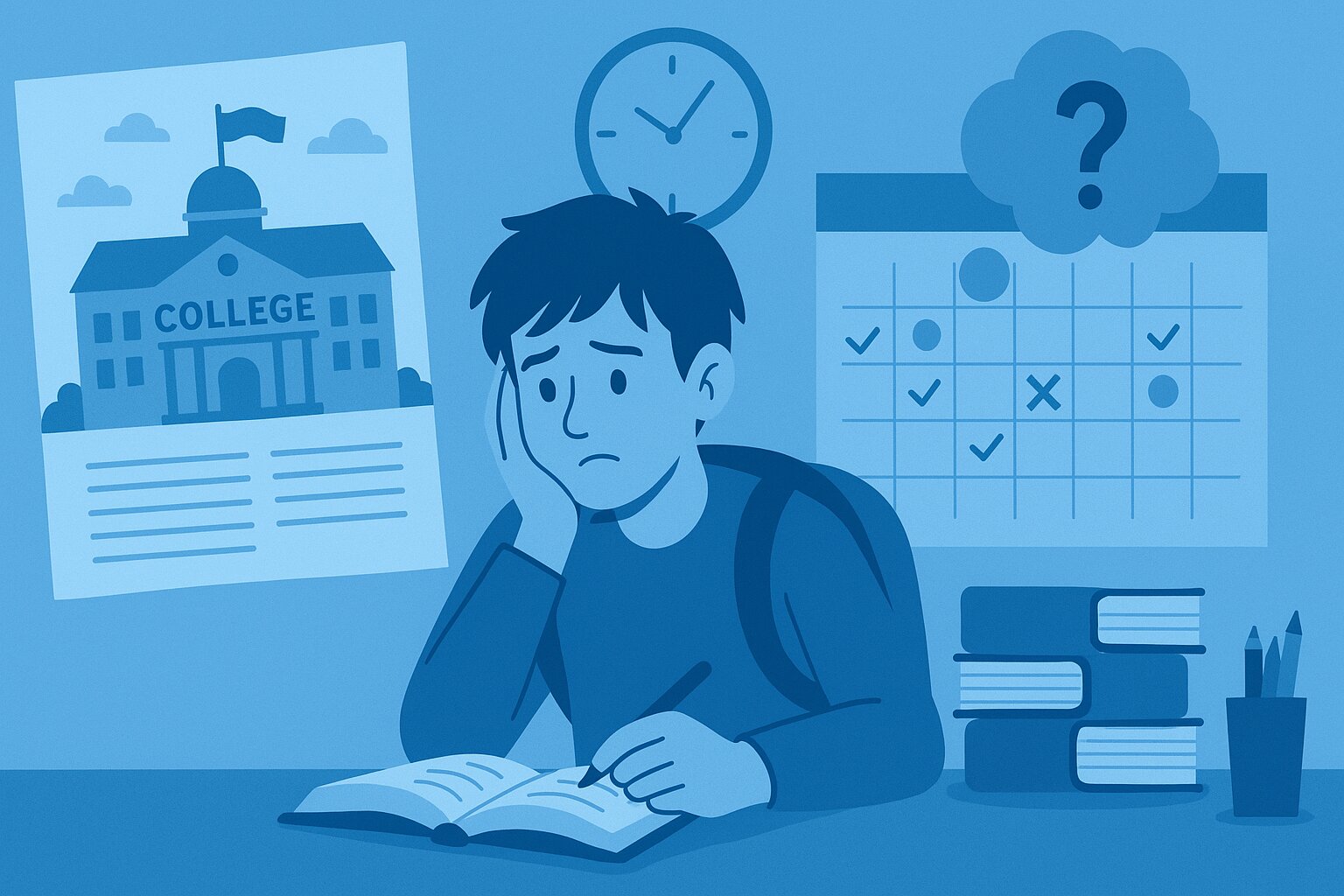Melissa, a 14-year-old with ADHD, had just been dropped off at Untapped after she had played well in her soccer game. She was excited about how she played, but her mood quickly changed when we looked at her assignment portal and discovered she had a research paper due the next day. It had been assigned on Monday, and she had forgotten about it.
I could sense the frustration simmering just beneath the surface. “I can’t believe this is happening!” she said, her voice rising. “I just finished my soccer game, and now my parents are going to be furious with me because I will be up all night finishing it.”
We frequently encounter this situation at Untapped Learning. Though it is frustrating, this situation can be averted.
Planning and problem-solving are two distinct, yet closely intertwined, skills. Planning involves preparation and foresight, while problem-solving entails finding solutions when plans change unexpectedly.

At Untapped, planning is one of the primary executive function skills we work on with students of all ages. During a session, the first thing an Untapped coach will do is work with the student to make a plan for the week. Without a written plan, a student may just complete assignments in the order they pop into their head, with no real forethought or prioritization. The adults in the room know that things rarely go exactly according to plan, but a plan at least gives us a starting point. If students try to figure out how to tackle missing assignments without forming some kind of plan, there’s no direction to their attempted problem-solving. So to summarize: #1, make a plan; #2, adjusting the plan is normal when things don’t happen as expected.
Problem-solving without a plan is kind of like shopping without a grocery list: it’s not that you’ll come home empty-handed, but you’ll save yourself some time (and money, for the sake of the metaphor) if you pause to jot down the items you know you need before you leave for the store.
These skills are integral throughout a student’s academic journey. Planning helps with homework and assignment completion, and problem-solving is exercised through tasks and assignments given to students. While each individual may approach planning and problem-solving differently, these skills can be broadly improved.

The Essence of Planning and Problem-Solving
Planning involves looking ahead and preparing for future tasks or events. It serves as a roadmap for achieving goals and managing time effectively. On the other hand, problem-solving is about adapting when plans go off track. It requires critical thinking to overcome obstacles and devise solutions.
Why These Skills Matter for Students with ADHD
For students with ADHD who often face executive function challenges, planning and problem-solving skills are crucial. They contribute to:
– Effective Time Management: Planning helps organize tasks, prevent procrastination, and ensure timely completion of work.
– Enhanced Working Memory: Planning strategies can improve memory and focus by keeping track of tasks and deadlines.
– Real-world Application: Problem-solving extends beyond academics, aiding in everyday decision-making and critical thinking.

Identifying Struggles in Students with ADHD
Students with ADHD may exhibit difficulties in:
– Tracking assignments and understanding their requirements.
– Organizing and maintaining a planner or schedule.
– Engaging in abstract thinking to solve complex problems.
These challenges often stem from executive function deficits, impacting memory, flexible thinking, and self-control.
Parental Strategies for Support
As a parent, your role in developing planning and problem-solving skills in your child with ADHD is multifaceted:
– Create a Planning Routine: The families we have seen have the most success with teaching planning make it a weekly routine. For example, every Sunday at 6 PM, everyone sits at the kitchen table for 10 minutes and plans our their upcoming week.
– Structured Scheduling: Utilize visual tools like calendars, planners, or apps to make schedules tangible and understandable. At Untapped, we’re big proponants of digital calendars and planners—if you can pull it up on your phone, you will always have access to it.
– Joint Prioritization Exercises: Collaborate with your child to categorize tasks by importance and deadlines. Use visual aids like color-coded systems or priority lists. If your priorities aren’t lining up, take some time and figure out why your child is prioritizing differently than you are, and see if you can talk through it productively.
– Real-Life Problem-Solving: Regularly engage your child in real-life scenarios that require problem-solving. Discuss different approaches and their outcomes to enhance critical thinking.
– Building Independence: Gradually encourage your child to take charge of their own planning and problem-solving. Offer guidance, but allow them to make decisions and learn from the outcomes.
– Encourage Reflective Thinking: Post-task reflections can be invaluable. Discuss what worked, what didn’t, and how things could be done differently next time.

Educator’s Role in Enhancing Skills
Teachers have a significant impact on the development of these skills. Individualizing lessons for each student can be incredibly challenging in a classroom full of students with varying needs. However, implementing even one strategy can improve students’ planning and problem-solving skills.
– Explicitly Model and Teach Planning Skills: For the first several weeks of the course, take the time to model how to prepare for an exam or project. Teach your students to plan backward, or “backwards engineer” a project, to set them up for success on the next project. Modeling what you want them to do often decreases student anxiety as well!
– Planner Checks: Regularly review students’ physical or digital planners for completeness and accuracy. This ensures effective task tracking and management.
– Prioritization Guidance: Allocate class time for students to organize their tasks, providing specific advice on what should take priority.
– Group Problem-Solving Activities: Facilitate group work that challenges students to solve complex problems, simulating real-world scenarios collaboratively.
– Creative Thinking Exercises: Present hypothetical situations to stimulate abstract thinking. Allow students to share their solutions and discuss their viability.
– Promote Self-Advocacy: Encourage students to seek help proactively if they fall behind. This cultivates responsibility and accountability as well as problem-solving skills.
– Frequently Update the Classroom Website: It is greatly appreciated by parents, guardians, counselors, special educators, and any support staff when teachers frequently update their online portals for grades, class updates, notes, and assignments. It allows for families to provide students with better support and decreases student confusion and email communications from parents and students.

Collaboration Between Home and School
The synergy between home and school environments is crucial. Consistent strategies and reinforcement across both settings create a stable framework for students to thrive. Regular communication between parents and educators ensures alignment of goals and methods.
Planning and problem-solving are not just academic skills, but life skills that students carry into adulthood. For children with ADHD, mastering these skills requires patience, practice, and support from both parents and educators. Each child’s journey is unique, and they can achieve success and independence with the right approach.
Navigating the journey with ADHD can be challenging, but with the right tools and support, it becomes a path filled with growth and achievement. Remember, every step forward, no matter how small, is progress.
For more helpful tips on improving executive function skills — visit https://untappedlearning.com to learn more about our mentoring program.
As an educator, you work tirelessly to support your students’ growth and success. Thank you for all that you do. Let Untapped help your staff develop strategies to improve all students executive function skills.
For More:
Why Kids with Executive Function Challenges Have Trouble with Planning
8 Principles for Supporting Students with ADHD
Targeting Home-School Collaboration for Students with ADHD
Helping the Student with ADHD in the Classroom: Strategies for Teachers
How to Help Children With ADHD Develop Problem-Solving Skills





